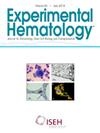A new anchor point for gut microbiome to regulate complications of allogeneic hematopoietic stem cell transplantation: oxidative stress
IF 2.1
4区 医学
Q2 HEMATOLOGY
引用次数: 0
Abstract
Allogeneic hematopoietic stem cell transplantation (allo-HSCT) is a cure for many malignant hematologic and metabolic diseases, whose complications are an unignorable cause of long-term prognosis. Pretreatment chemoradiotherapy administered before and after transplantation alters the state of the bone marrow hematopoietic microenvironment. Under the stress of hematopoietic injury, a large number of hematopoietic stem cells (HSCs) proliferate and differentiate, producing large amounts of reactive oxygen species (ROS). In addition, the chemotherapeutic pretreatment drugs also cause oxidative stress (OS) themselves, which can indirectly exacerbate OS of the bone marrow microenvironment. The bone marrow hematopoietic microenvironment and local OS affect the development of infections, relapse, graft-versus-host disease (GVHD), poor graft function (PGF), persistent thrombocytopenia (PT), chronic fatigue syndrome (CFS), bronchiolitis obliterans syndrome (BOS), and transplant-associated thrombotic microangiopathy (TA-TMA). Recent studies have demonstrated that the gut microbiome (GM) and its metabolites such as short-chain fatty acids (SCFAs), secondary bile acids, trimethylamine (TMA) and signaling molecules such as H2S and NO can enter the bloodstream through the intestinal epithelium and reach all parts of the body. This review describes the impact of OS on the development of allo-HSCT complications. In this article, we will elucidate the mechanism of OS on allo-HSCT complications, summarize the interaction between GM and OS in the body, and highlight the role of GM regulation of OS in allo-HSCT complications to offer new strategies for the prevention and treatment of allo-HSCT complications.
肠道微生物组调节异基因造血干细胞移植并发症的新锚点:氧化应激。
摘要:虽然已有大量文献关注肠道微生物群与同种异体造血干细胞移植(allogeneic hematopoietic stem-cell transplantation, alloc - hsct)术后主要并发症之间的关系,但很少文献提及氧化应激在这一过程中的作用。本文阐述了氧化应激对异体造血干细胞移植并发症的作用机制,总结了体内GM与氧化应激的相互作用,强调了GM对氧化应激在异体造血干细胞移植并发症中的调节作用。我们希望为临床医生制定新的同种异体造血干细胞移植并发症的预防和治疗策略提供思路。最后,我们想做以下声明:所描述的工作没有全部或部分提交到其他地方发表,并且所有列出的作者都已经批准了所附的手稿。同种异体造血干细胞移植(Allogeneic hematopoietic stem cell transplantation, allo-HSCT)是治疗许多恶性血液病和代谢性疾病的一种方法,其并发症是影响长期预后的一个不可忽视的因素。在移植前后进行放化疗可以改变骨髓造血微环境的状态。在造血损伤的应激下,大量造血干细胞(hematopoietic stem cells, HSC)增殖分化,产生大量活性氧(reactive oxygen species, ROS)。而化疗前药物本身也会引起氧化应激(oxidative stress, OS),从而间接加重骨髓微环境的OS。骨髓造血微环境和局部氧化应激影响感染、复发、移植物抗宿主病(GVHD)、移植物功能不良(PGF)、持续性血小板减少(PT)、慢性疲劳综合征(CFS)、闭塞性细支气管炎(BOS)、移植相关性血栓性微血管病(TA-TMA)等的发生。最近的研究表明,肠道微生物组(gut microbiome, GM)及其代谢产物如短链脂肪酸(SCFAs)、次级胆汁酸(SBAs)、三甲胺(TMA)和信号分子如H2S、NO等可以通过肠上皮进入血液,到达身体的各个部位。本文综述了氧化应激对同种异体造血干细胞移植并发症发展的影响。本文将阐明氧化应激对同种异体移植并发症的作用机制,总结体内GM与氧化应激的相互作用,并强调GM调控氧化应激在同种异体移植并发症中的作用,从而为同种异体移植并发症的防治提供新的策略。
本文章由计算机程序翻译,如有差异,请以英文原文为准。
求助全文
约1分钟内获得全文
求助全文
来源期刊

Experimental hematology
医学-血液学
CiteScore
5.30
自引率
0.00%
发文量
84
审稿时长
58 days
期刊介绍:
Experimental Hematology publishes new findings, methodologies, reviews and perspectives in all areas of hematology and immune cell formation on a monthly basis that may include Special Issues on particular topics of current interest. The overall goal is to report new insights into how normal blood cells are produced, how their production is normally regulated, mechanisms that contribute to hematological diseases and new approaches to their treatment. Specific topics may include relevant developmental and aging processes, stem cell biology, analyses of intrinsic and extrinsic regulatory mechanisms, in vitro behavior of primary cells, clonal tracking, molecular and omics analyses, metabolism, epigenetics, bioengineering approaches, studies in model organisms, novel clinical observations, transplantation biology and new therapeutic avenues.
 求助内容:
求助内容: 应助结果提醒方式:
应助结果提醒方式:


